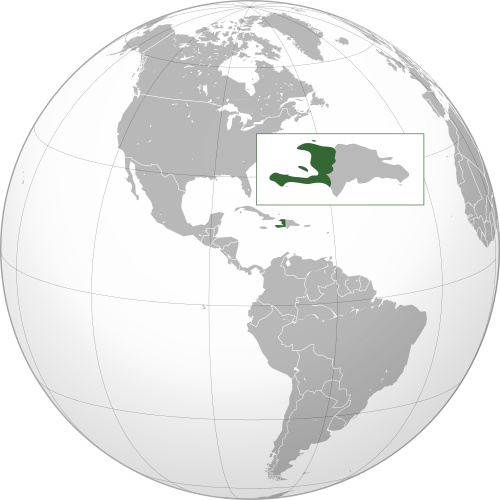 Haiti (pronounced /ˈheɪti/; French Haïti, pronounced: [a.iti]; Haitian Creole: Ayiti, Haitian Creole pronunciation: [ajiti]), officially the Republic of Haiti (République d’Haïti ; Repiblik Ayiti) is a Caribbean country. Along with the Dominican Republic, it occupies the island of Hispaniola, in the Greater Antillean archipelago. Ayiti(land of high mountains) was the indigenous Taíno or Amerindian name for the mountainous western side of the island. The country’s highest point is Pic la Selle, at 2,680 metres (8,793 ft). The total area of Haiti is 27,750 square kilometres (10,714 sq mi) and its capital is Port-au-Prince. French and Haitian Creole are the official languages.
Haiti (pronounced /ˈheɪti/; French Haïti, pronounced: [a.iti]; Haitian Creole: Ayiti, Haitian Creole pronunciation: [ajiti]), officially the Republic of Haiti (République d’Haïti ; Repiblik Ayiti) is a Caribbean country. Along with the Dominican Republic, it occupies the island of Hispaniola, in the Greater Antillean archipelago. Ayiti(land of high mountains) was the indigenous Taíno or Amerindian name for the mountainous western side of the island. The country’s highest point is Pic la Selle, at 2,680 metres (8,793 ft). The total area of Haiti is 27,750 square kilometres (10,714 sq mi) and its capital is Port-au-Prince. French and Haitian Creole are the official languages.
Haiti’s regional, historical, and ethno-linguistic position is unique for several reasons. It was the first independent nation in Latin America and the first black-led republic in the world when it gained independence as part of a successful slave rebellion in 1804. Despite having common cultural links with its Hispano-Caribbean neighbors, Haiti is the only predominantly Francophone independent nation in the Americas. It is one of only two independent nations in the Americas (along with Canada) that designate French as an official language; the other French-speaking areas are all overseas départements, or collectivités, of France.
Haiti is the poorest country in the Americas as per the Human Development Index. It has experienced political violence throughout its history. Most recently, in February 2004, an armed rebellion forced the resignation and exile of President Jean-Bertrand Aristide, and a provisional government took control with security provided by the United Nations Stabilization Mission in Haiti (MINUSTAH). Rene Preval, the current president, was elected in the Haitian general election, 2006.
On January 12, 2010, a 7.0 magnitude earthquake struck Haiti and devastated the capital city, Port-au-Prince. Although the exact number was difficult to determine, reportedly more than 230,000 people were killed. The Presidential palace, Parliament and many other important structures were destroyed, along with countless homes and businesses, leaving many homeless.
Haiti has a long and storied history and therefore retains a rich culture, mostly from voodoo tribes. Haitian culture is a mixture of primarily French, African elements, and native Taíno, with influence from the colonial Spanish. The country’s customs essentially are a blend of cultural beliefs that derived from the various ethnic groups that inhabited the island of Hispaniola. In nearly all aspects of modern Haitian society however, the European and African elements dominate. Haiti is world famous for its distinctive art, notably painting and sculpture.
Agriculture is the principal economic activity in Haiti. Subsistence crops include cassava, rice, sugarcane, sorghum, yams, corn, and plantains. Most Haitians own and farm tiny plots of land, and great population density has caused rural poverty and is also a factor in the country’s extensive deforestation, which has contributed to the degradation of agricultural land. Haiti’s major exports are light manufactures and coffee; other exports include oils, cocoa, mangoes, sugar, sisal, and bauxite. The United States is the country’s leading trading partner.
Industry in Haiti consists largely of light assembly of imported parts and the manufacture of textiles. There is also sugar refining and flour milling, and other foodstuffs are produced. Some bauxite and copper are mined, but other mineral deposits have barely been tapped. Remitttances from Haitians working abroad are also extremely important. Economic sanctions imposed by the United States and others to force a military regime to return power to the elected government, and again later because of the government’s inability to meet aid conditions, further damaged the impoverished economy during the 1990s and early 2000s.
Notes from Wikipedia and Answers.com









